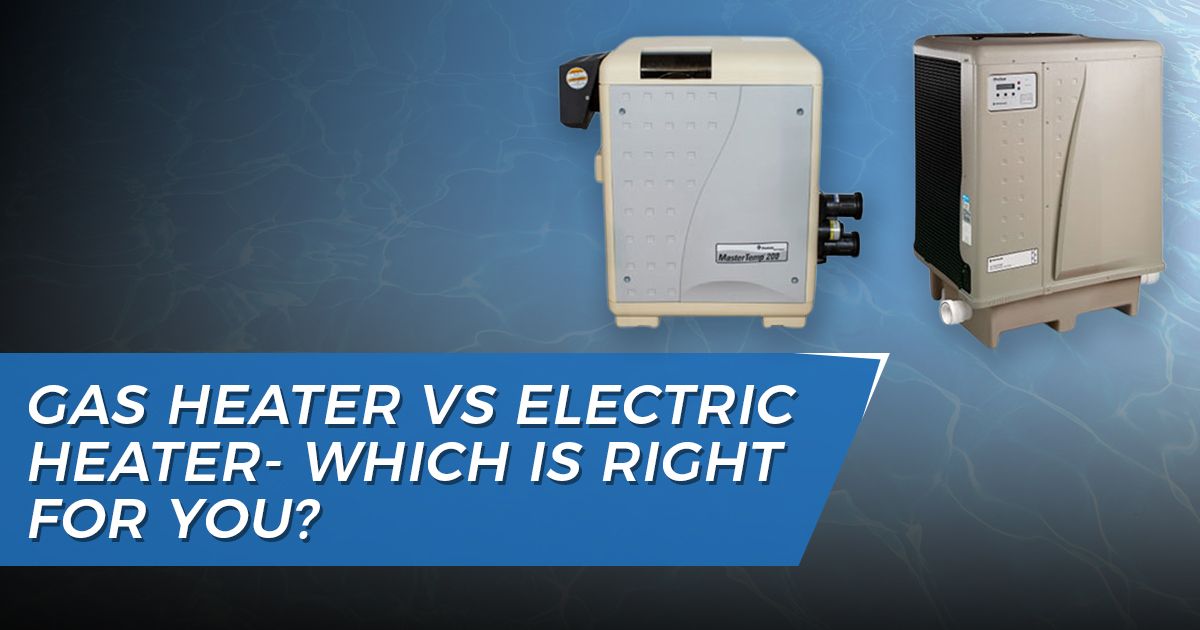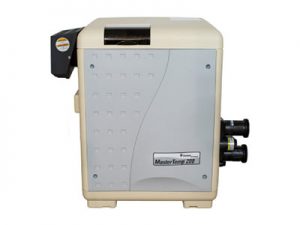Gas Heater vs Electric Heater: Which is Right For You?
Living in Florida means you can get time out of your pool for most of the year. However, there are times when the water temperature may not be quite as warm as you’d like. And if you’d like it to be comfortable all year, one thing is a necessity. However, deciding if a gas heater vs electric heater is right for you depends on a few things. We’ll take a look at both to help you decide which is best for your backyard pool.
Related Article: 4 Swimming Pool Heater Options To Enjoy Swimming All Year
Choosing a Gas Heater vs Electric Heater
While the difference in gas vs electric heat is pretty obvious, you may not be as aware of the fact that each has two heater types. Gas encompasses natural gas or propane. Electric could be electric resistance or electric heat pumps.
It’s also important to know that each choice has costs that vary greatly based on a few factors. The only sure way to determine which option works best for you is to compare them across the board and determine which you would prefer to work with. Let’s take a deeper look at each.
The Pros and Cons of Gas vs Electric Heat
As mentioned before, you can use natural gas or propane to heat up the water. Year after year, they remain one of the most popular types. This might be because gas works considerably faster and tends to be less expensive.
The Cost of a Gas Heater vs Electric Heater
Some might say that gas is less expensive, but that’s only part of the story. Gas is typically cheaper than electric when it comes to the initial cost. However, it relies on the prices of natural gas and propane, meaning that despite the equipment being a bit on the less expensive side, the cost to operate a is usually more expensive in the longer run.
Electric swimming pool heaters differ quite a lot from gas in terms of costs. The units tend to be more expensive upfront and the cost of installation is a bit more because of their intricacies. However, electric is usually cheaper in the long run. Electric also tends to be more reliable than gas and has a longer lifespan.
Efficiency and Installation
By nature, gas heaters have a greater environmental impact than electric ones. However, electric heaters take longer to warm up your pool water and are less efficient in very cold temperatures. This is because they rely on outside heat to warm up the pool water. You can avoid these issues, however, by using a pool cover. The cover will help trap the heat in the water and thus make the process quicker.
Additionally, to set up a natural gas pool heater, you will have to connect the unit to your gas line. Propane needs a propane tank to work. But electric requires certified technicians who can safely and properly install the equipment.
The Best in Gas Heaters
At GPS Pools, we carry three different brands of gas and propane heaters to ensure you’re able to have the pool experience you’ve always wanted.
Related Article: Gas Pool Heater: Choosing the Right One
Pentair MasterTemp Low Gas Heater
The Pentair MasterTemp Low Gas is an eco-friendly and ultra-high performance product. It offers best in class energy efficiency, convenience, and reliability. On top of performance, it’s super-quiet operation won’t intrude on your backyard experience. Additionally, with its digital capabilities, your pool or spa can be the perfect temperature at the push of a button.
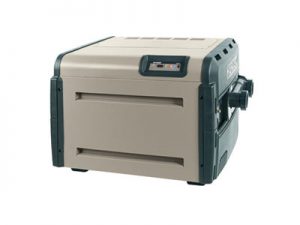 Hayward Universal H-Series Gas Heater
Hayward Universal H-Series Gas Heater
You have 250K or 400K BTU to choose from with the Hayward Universal H-Series Gas Heaters we carry. These models are environmentally friendly due in part to their hydraulic design that significantly reduces the circulation pump run time. Since the flow is well managed, this Hayward unit is resistant to chemical corrosion and salt water. It can even tolerate modern salt-based electronic chlorination systems.
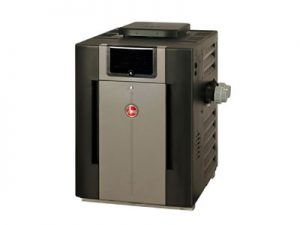 Rheem Digital Propane Heater
Rheem Digital Propane Heater
With a contemporary design, the Rheem Digital Propane Heater is one of the best propane options on the market today. Its design technology includes a Fire Tile ceramic fiber combustion box that keeps the product running efficiently while ensuring the outside jacket stays cool. This is a great safety feature for families, as it won’t retain heat when it’s turned off. Rheem also recently obtained the highest efficiency ratings out there.
The Best in Electric Heaters
As a leading provider of pool equipment, we carry a few brands of electric heaters to suit your preferences and needs.
Related Article: How To Choose the Right Electric Swimming Pool Heater
Related Article: Pool Heat Pumps: The Pros and Cons of This Type of Heater
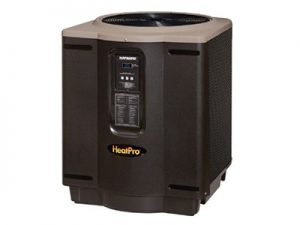 Hayward Heatpro Heat Pump
Hayward Heatpro Heat Pump
For ideal water temperature, without using much energy, the Hayward Heatpro Heat Pump is an energy-efficient, durable, and easy way to heat your pool. It’s ArmourCoil protected heat exchange powers the water through the system and heats it before returning it to your pool. It maintains water temperature with an electronic temperature control, resulting in incredible energy savings. Sometimes, jup to 80 percent on heating costs.
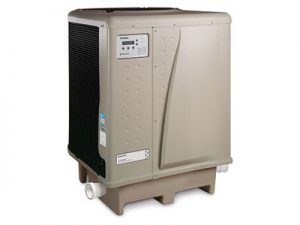 Pentair UltraTemp Heat Pump
Pentair UltraTemp Heat Pump
Pentair is known for reliability and energy-efficiency, and this UltraTemp Heat Pump is no different. It quietly and efficiently maintains the temperature of your pool so that when you’re ready to swim, your pool is ready for you. And because of its user-friendly LCD control board display, it’s extremely easy to operate.
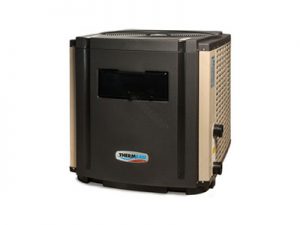 Thermeau Prestige Heat Pump
Thermeau Prestige Heat Pump
If you’re looking for record heating time, the Thermeau Prestige Heat Pump could set industry standards. Plus, this model doesn’t sacrifice efficiency for speed. With unprecedented electrical and mechanical components, the product uses 5 or 6 times less energy than conventional heat pumps.
Gas Heater vs Electric Heater: You Choose
Remember to consider the following when trying to decide between a gas vs electric heater for your pool:
- Price at the onset and in the long run,
- Energy efficiency,
- Heat consistency,
- Installation, maintenance, and repair.
If you are unsure which type is better for you, consider how often you plan on using one. Also, take into account the average temperature of the area you live in and whether or not you plan on swimming during cooler seasons. Remember, the experts at GPS Pools are always here to help. For more information and advice regarding brands, models, and our pool heating installation services, contact us at one of our locations in New Tampa, Lutz, or Land O’ Lakes.

